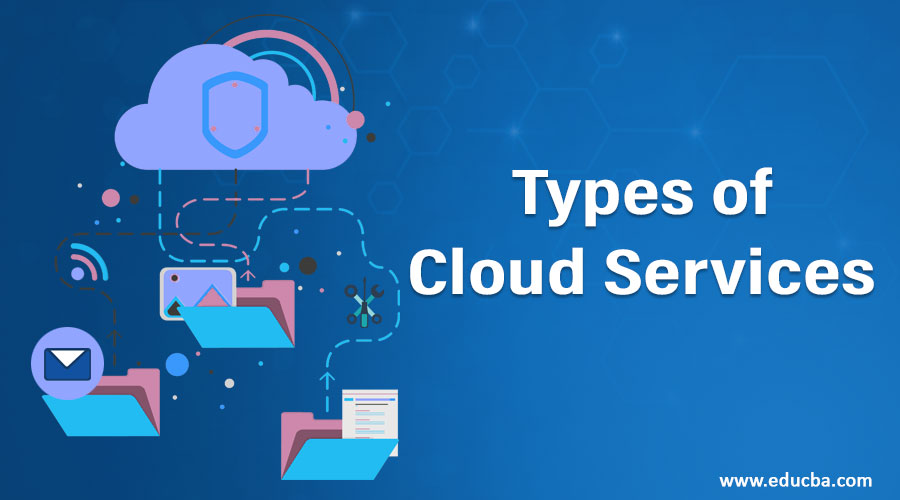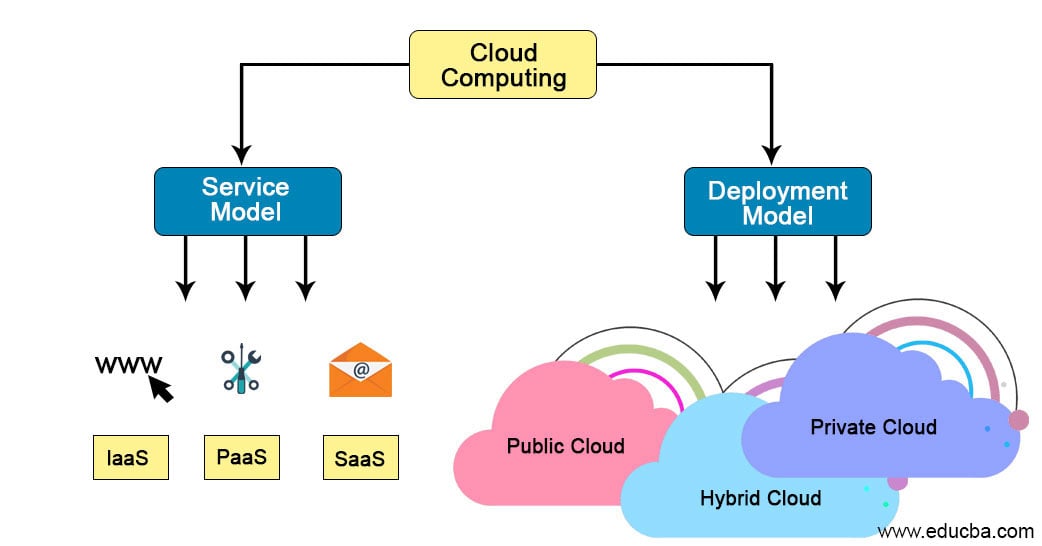Updated June 9, 2023

Introduction to Types of Cloud Services
Cloud computing services are divided into four types. They are Infrastructure as a Service (IaaS), Platform as a Service (PaaS), Software as a Service (SaaS), Network as a Service (NaaS) and Function as a Service (FaaS). These four types are called cloud computing stack as one is built on top of the other service. Also, cloud deployments are of three types based on the organization’s ability such as Public cloud, Private cloud, hybrid cloud, and community cloud. Cloud provides the management and flexibility of the application. We have control of our information while using the cloud.
What are Cloud Services?
The service offered through the internet to the users on-demand rather than by the company’s own servers is called cloud services. The data is stored in pools or digital servers and is available any time through the internet. Cloud services refer to any applications, services or resources. The service is managed by the cloud service provider. The provider provides all the resources needed for the application and hence the company needs not to worry about resource allocation. Cloud services can dynamically scale up based on users’ needs. We can say that the cloud is the delivery of servers, storage, and backups online. Service providers charge companies for cloud usage.
The data can be stored online and also backed up, documents can collaborate easily, database processing can be done and technical support services can be managed. Also, new applications can be created and managed, data is recovered and streaming audio and video, data analysis, and prediction are done using cloud services. Users’ activity is tracked easily using cloud and hence it is made secure.
The idea of cloud started in the 1950s. By the beginning of the 1990s, cloud services were used by everyone due to the IT revolution. Cloud service provision started only by 2000. The advancement in the cloud grows day by day. All the organizations, irrespective of size use cloud services. Due to the new features such as customer relationship management, data management, delivery applications, enterprise resource management, industries use cloud services in all forms.
Now the applications need not be downloaded in the system to use. Cloud infrastructure helps the organizations to use applications at their own pace and with no license issues. Hence the storage and time of download are saved. Also while using the application in the cloud, the application works faster than the local network. The advantages of cloud services are scalability, accessibility, speed, less cost, automatic update, patch updating, data recovery, security, less power, no physical servers in the organizations and collaboration of storage with different enterprises.
Types of Cloud Services
Cloud Services can be classified based on their computing services and deployment method.
Based on Computing Services
Different cloud services based on computing services are explained below:
1. Infrastructure as a Service (IaaS)
The model that has the infrastructure to be delivered for outsourcing in order to support operations inside the enterprise is called IaaS. The hardware, software, storage, data centers, servers, and network space is provided in this service. IaaS is rightly called Hardware as a Service (HaaS). Platform virtualization is done in IaaS.
2. Platform as a Service (PaaS)
The service that provides hardware and software tools for application development for users is called PaaS. Various components are incorporated with the organization’s underlying infrastructure using this service. Also, it provides database management systems and programming language libraries. Editing, compilation, testing, and version management can be done in this service. Web service integration is an advantage of PaaS. This service is simple and easy to use.
3. Software as a Service (SaaS)
In this service, software distributed is centrally hosted and licensed. SaaS is similar to the Application Service Provider (ASP). A single copy of an application is created by the provider that is given to all users. Users can add new features or functionalities based on their use to the software based on the agreement with the provider. APIs can be integrated with the company’s own tools.
4. Function as a Service (FaaS)
Users can build, run and secure the application with all its functionalities and services using FaaS. Services are event-driven and users are charged based on their usage. Users need not worry about the servers and their work. The tasks can be scheduled and the apps of higher storage can be used easily in this service.
5. Network as a Service (NaaS)
Users who do not want to use their own networks take help from service providers to host the network infrastructure. The connectivity and bandwidth are provided by the service provider for the contracted period. It basically represents the network as transport connectivity. Network virtualization is done in this service.
Based on Cloud Deployment
Different cloud services based on cloud deployment are explained below:
1. Public Cloud
Users over the internet use cloud services in which the infrastructure is based on the cloud computing company. However, the public cloud is not secure and organizations with sensitive information are not ought to use this cloud. The information is available for everyone who uses the cloud.
2. Private Cloud
The cloud infrastructure is located inside the organization and it is not shared with anyone without the permission of the organization is called the private cloud. We can say private cloud is most secure among all the cloud deployments. Customization, scaling, and flexibility control is higher in the private cloud. Hardware and software are built only for the owner.
3. Hybrid Cloud
The combination of private and public cloud deployments is called the hybrid cloud. Organizations have the advantage of public cloud while doing heavy workloads and the information is secure as private cloud is incorporated within the same.
4. Community Cloud
The deployment model provided for a limited number of individuals and organizations so that the services are enjoyed only within themselves are called community cloud. This is provided either internally or externally and hosted based on the need.
Different types of cloud services help users in all ways to fully use the service. Service providers use their full potential to serve customers. The customers should be vigilant for their data to be secure through service providers offer full security.
Recommended Articles
This is a guide to Types of Cloud Services. Here we discuss what are cloud services? along with different types based on computing service and cloud deployment. You may also look at the following articles to learn more-


